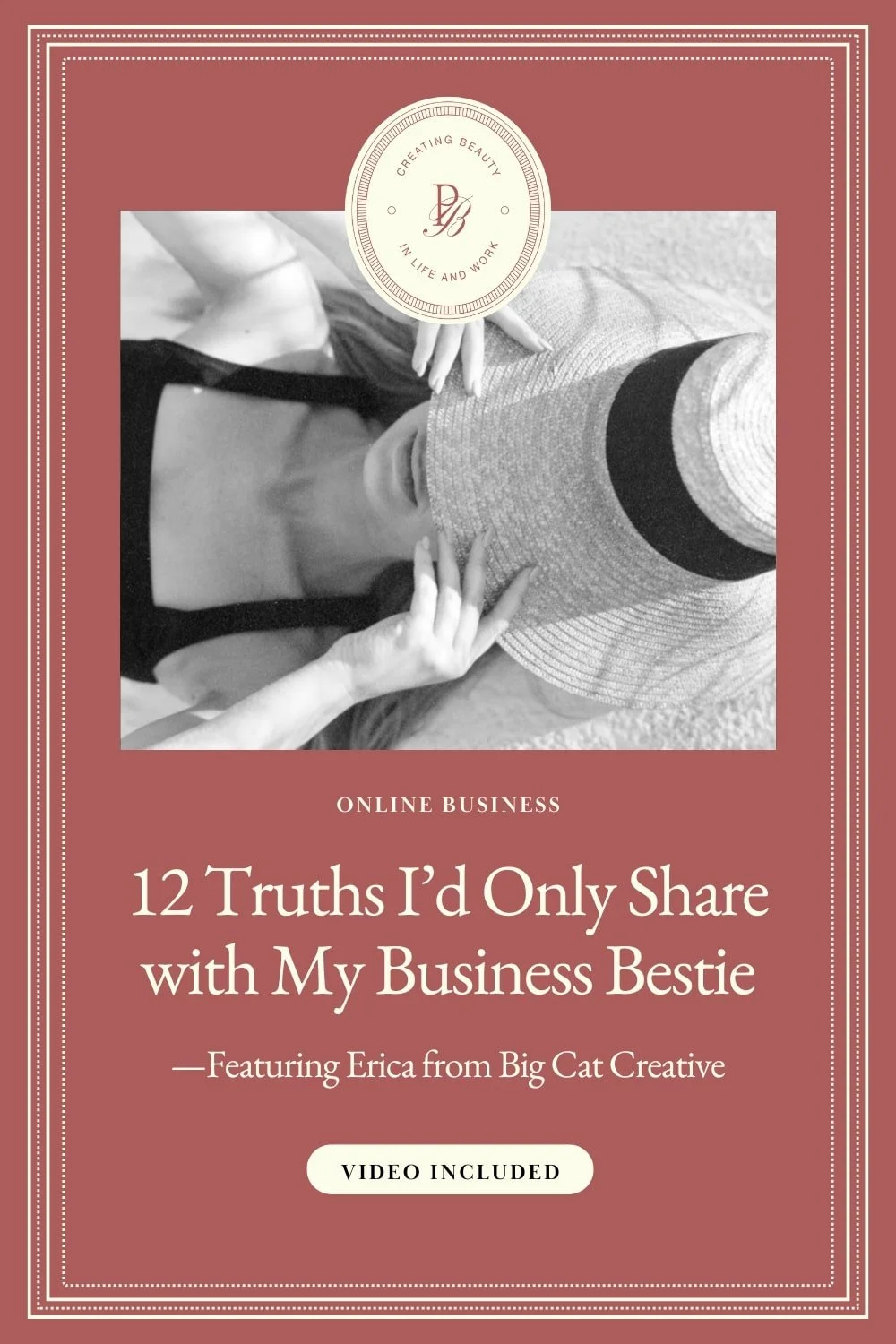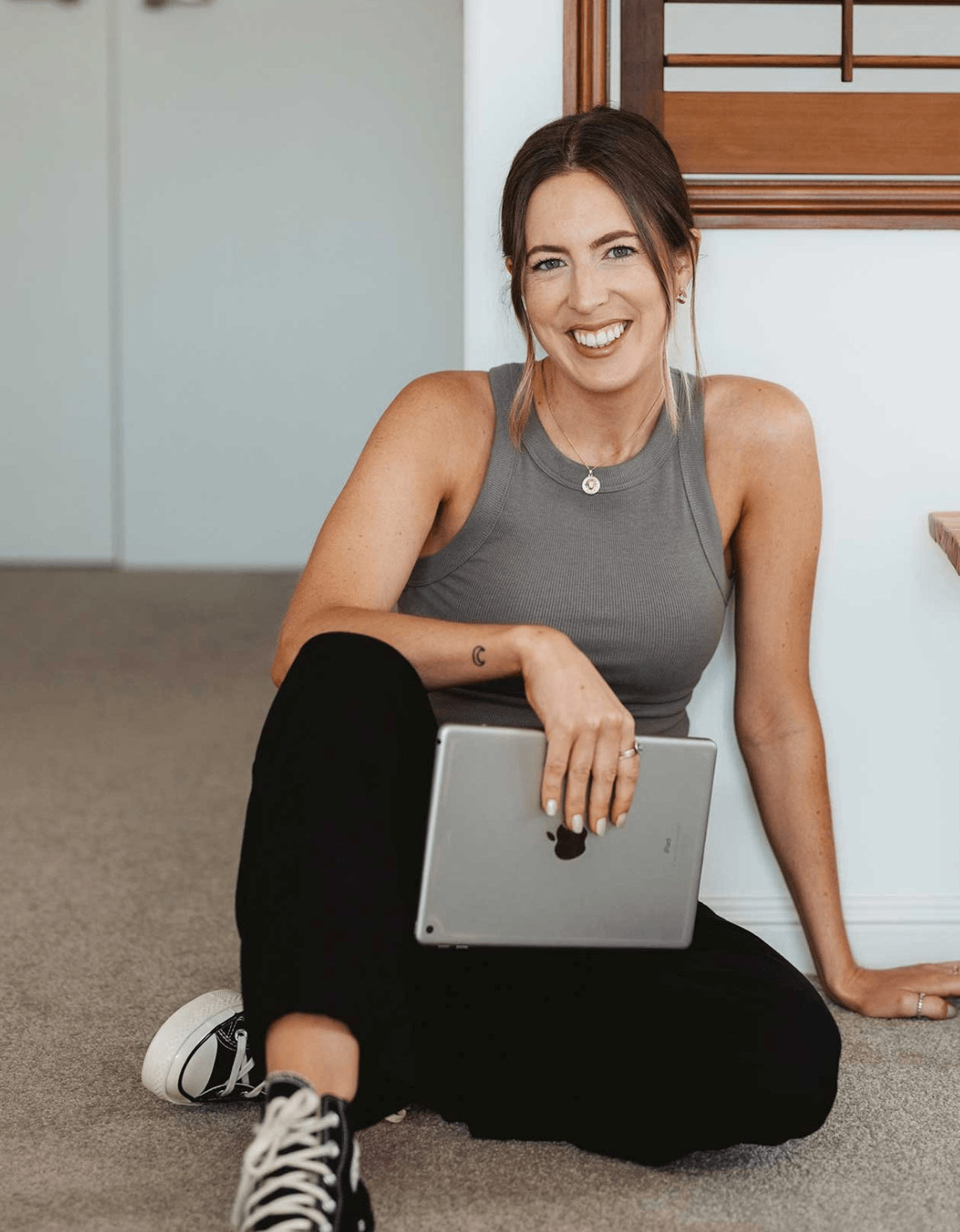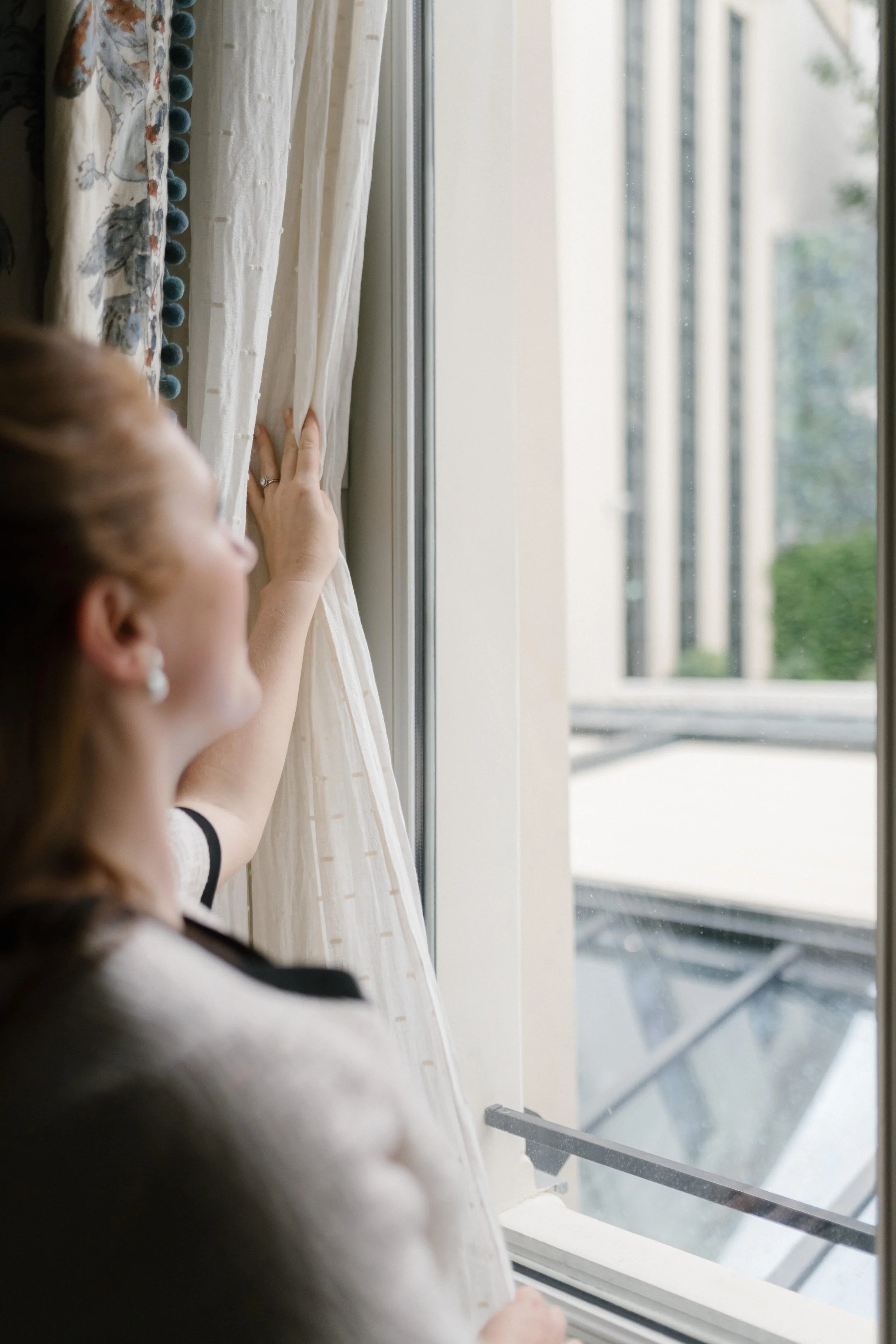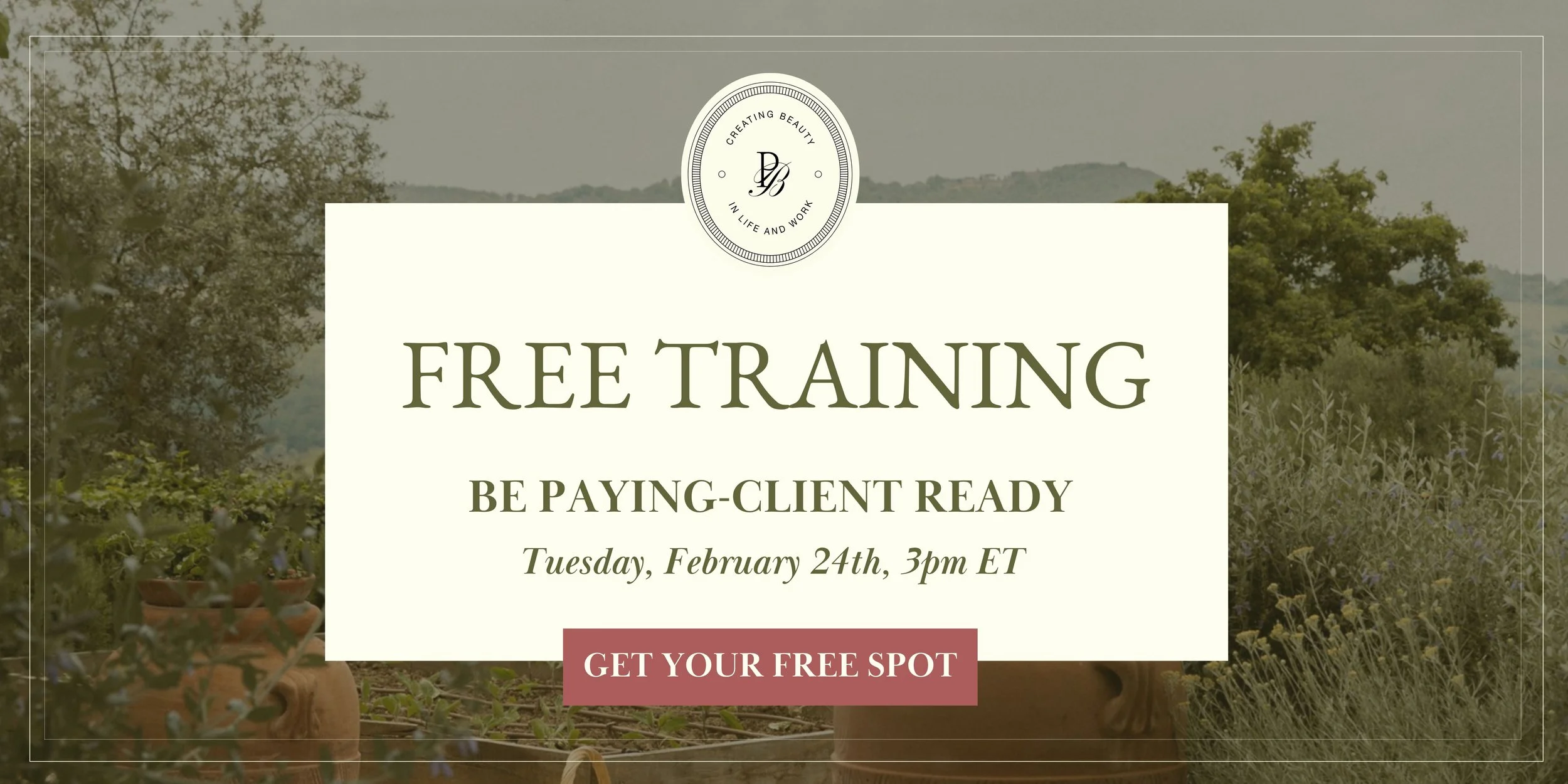12 Truths I’d Only Share with My Business Bestie —Featuring Erica from Big Cat Creative
Prefer to watch?
Here’s the video!
Mentioned in the Video:
*Yup - that’s an affiliate link! My margarita fund thanks you kindly!
Rather read all about it?
Meet Erica
Founder of Big Cat Creative
So many of us long for a business bestie—the kind of person you can sit down with, sip something warm, and chat about life, work, and all the messy, beautiful bits in between.
Some of you have that already.
Others? Not yet. So I thought I’d share one of my own favorite conversations with you.
I recently sat down with my dear friend Erica from Big Cat Creative, and what started as a casual chat quickly turned into something deeper:
12 honest truths about what it really looks like to build a business that fits your life.
We talked about everything:
redefining success
learning to unplug
hiring mistakes
pricing mindset
running a design business without social media.
So much more!
If you’ve been craving a cozy, unfiltered, perspective-shifting conversation with someone who gets it—this one’s for you.
We sat down just like we do in real life (ideally by a pool, iced coffee in hand), and talked through what’s working, what we’ve learned the hard way, and what we’re still figuring out.
Here are the 12 truths that came out of that conversation.
Truth #1: I don’t have work-life boundaries… but I also don’t need them.
One of the first things I asked Erica?
“What’s one thing—either in life or business—that you just refuse to do?”
“That was a huge shift—getting to a point where I could truly unplug. It changed everything.”
Erica:
That’s a great question. The honest answer? I haven’t really set many hard boundaries because… my life is pretty simple.
I don’t have kids or big responsibilities outside of work, so right now I’m in a season where I actually enjoy giving a lot of energy to my business.
That said, I’ve built things in a way where I don’t have to work nonstop anymore. I can take a real holiday.
I can go hiking in the mountains without reception. My team can run things without me checking in every five minutes.
“
That was a huge shift—getting to a point where I could truly unplug. It changed everything.”
The Early Days Looked Very Different
Back then, I was doing everything myself. And even when I tried to take a break, I still had one eye on my inbox. Camping trips? Maybe. But real holidays? Not a thing.
That changed once I hired support. I started breathing easier. And the funny thing is—I still choose to check in sometimes, because I love my business. But the key difference is: I don’t have to.
Saying “No” to What Doesn’t Light You Up
One other thing I’ve learned to let go of? Doing things just because everyone else is.
Case in point: Podcast interviews.
I get asked to be on podcasts pretty regularly. And honestly? I usually say no. Not because I’m ungrateful—but because those kinds of interviews just don’t light me up.
There’s this pressure to be everywhere and say yes to everything. But we’ve both found so much freedom in only doing the things we actually enjoy—like this conversation right here.
Truth #2: I’m a total hermit during the workweek
Next up, I asked Erica one of my favorite behind-the-scenes questions:
If we followed you around for a week, what would we see? What are your hobbies, routines, and non-work things that make up your life?
“I’m a Hermit... But a Happy One.”
Erica:
Honestly? During the week, I’m a bit of a hermit. I spend most weekdays just working from home—tip-tapping away at my computer, doing my thing.
I do a morning workout on my reformer (yes, I have one at home).
I go rock climbing a couple of times a week—that’s my one consistent “outside” activity.
Aside from that? Not much of a social life during the workweek, and I’m okay with that.
“We work hard during the week… and then we disappear off the grid for a little playtime.”
Every few weeks, my partner and I pack up and head out—mountain biking, camping, hiking, visiting friends across the country. So while the weekdays are super focused, the weekends are all about adventure.
“It’s All In… Until It Isn’t.”
Paige:
Same here. When it’s a workweek, I go all in. No hard start or stop times—I’ll work as long as the ideas are flowing.
But I genuinely love it, so that rhythm works for me.
That said, I do have a few non-negotiables built into my week.
I take German classes twice a week in person—not because I’m crushing it (spoiler: I’m not), but because I know if I didn’t book the class, I’d never actually go. 😅
I’m the same with workouts. I won’t use a reformer at home, but I’ll happily book a class and go because I’ve paid for it and it’s in the calendar.
When It’s Vacation, It’s Vacation.
Because we’ve lived in so many places, we have friends scattered all over the world—which means we host visitors constantly.
Our home in Switzerland has become a bit of a revolving door for friends passing through Europe. And I love that.
In the winter, you’ll find us skiing (obviously… this is Switzerland). I fully stand by the claim that these are the best ski slopes in the world. And yes, the après is better in France—but I’m working on a whole blog post about that. 😉
“I realized I’ve basically become an après ski expert. So obviously, it needs a post.”
In the summer, we hike, swim, and take our stand-up paddleboard out on the lakes—it’s stunning. I need to get a GoPro so I can film it for you. It’s that magical.
One thing we both agreed on?
Boundaries aren’t about rules—they’re about freedom.
Paige:
When I go on holiday, I fully check out. I delete work apps from my phone, don’t have email on mobile, and intentionally step back. I still peek at YouTube (because I love it), but that’s just for fun.
Erica:
Wait, that’s amazing. You delete the apps? That’s next-level boundary setting. I’m impressed.
Paige:
Honestly, otherwise I’d check. Someone messages me and I’d feel pulled in. So I just remove the temptation completely.
Truth #3: Success looks like freedom to me—not more money.
So many of us define success differently—and it can change dramatically over time.
For some, it's the number in your bank account. For others, it’s how often you get to unplug for a proper vacation. I asked Erica how she thinks about success today—and how that definition has evolved over the years.
Success
Then vs. Now
Erica:
It’s definitely shifted. When I first started my business, success meant one thing: make enough to live.
Then once I hit that, the goalpost moved. I set my sights on buying a house—and that became my motivation for a while. Once that happened, I had this moment of, “Okay… now what?”
These days, success feels a lot more long-term. I’m thinking about future planning—being set up to retire early if I want to, or being able to step back from the business when life calls for it.
If I have a child one day, I want a business that can run without me. I want income streams that don’t depend on me showing up every day.
“Right now, I feel successful because I have everything I want, I live comfortably, and I have time freedom. That means more than any number ever could.”
I don’t work full time. Some weeks I overdo it, some weeks I don’t work at all. My partner works for himself too, so we get to travel freely and design the lifestyle we want. If I had the money but not the freedom? That wouldn’t feel like success to me.
Paige:
Yes—same journey for me.
Make Work Optional.
It started with: How do I make enough to live?
Then: Okay, now I want to buy a house. (Which I did—only to realize later it wasn’t in the right country. Oops.)
Now, like you, I’m thinking about what happens next.
I want to make sure I’m not just earning well, but doing smart things with my finances so I’m not waking up ten years from now with regrets.
“The new goal? Make work optional.”
I was actually chatting with someone on a ski trip recently who had already surpassed his financial freedom number. And his perspective really stuck with me:
When work becomes optional, you start to evaluate everything differently. Even if you love what you do (and I do—about 90% of it!), there are always things you’re doing just because you have to.
Would I still do that 10–15% if I didn’t need to? Probably not.
I used a tool called Trajectory to actually work out the numbers—how much I’d need to live off of, when I’d need to hit it by, what I’d need to invest to get there.
It’s not exact, and obviously once I get close to the number, I’ll sit down with a real financial advisor. But for now? ChatGPT is my unofficial financial planner. 😅
Erica:
Same! I’ve done those calculations, too—and last year, I created this really detailed (and kind of beautiful, if I may say so) Google Sheet. It took four full days to build, but it totally changed how I think about saving and investing.
Now every time I’m tempted to buy something, I just think: “Nope. That’s going into the spreadsheet.”
“Honestly, nothing has been more motivating for me than seeing the long game in black and white.”
Truth #4: Outsourcing isn’t just for business—it’s for your life, too.
There’s a lot of talk in online business circles about building a team—but what about support at home? I asked Erica to spill the details: What’s she outsourcing? What’s she still doing herself? And how has she figured out the balance?
Erica:
I’ve tried a bit of everything—cleaners, meal services, you name it. Usually during busy work seasons when the last thing I wanted to do was scrub a shower or cook a full meal.
But honestly? I always seem to circle back to doing it myself.
If I had kids, I’d probably hire more help without question. But right now, I actually enjoy closing my laptop, popping on an audiobook, and making dinner. It’s a nice transition from work into something slower and more tactile.
“Cooking feels like a pause. A moment to reset, listen to something lovely, and step away from my desk.”
I do order groceries online for pickup—it saves time and still feels easy.
My husband handles the lawn and house maintenance. I do the cooking and cleaning. It’s a little traditional, but it works for us.
And having that audiobook while I do chores? Game changer.
Paige
We’ve definitely hired cleaners in the past—it was such a luxury in London. And when we lived there, we even had a laundry service. Total heaven. You’d drop it off, and it’d come back the next day, folded and fresh.
Honestly? Life-changing.
Same in Bali. You could pop by a laundry spot between your villa and the co-working space. It was so easy and made such a difference.
Now that we’re in Switzerland, some of that convenience is gone, but I’ve gotten more intentional about what’s worth outsourcing.
“If you’re willing to spend $50 on a contractor for your business, why wouldn’t you spend $50 on a cleaner if it saves you five hours of your time?”
Once you start building a business, you start looking at all your time differently.
Whether it’s hiring someone in your business or your household, the question becomes:
What’s the best use of your energy?
If you hate cleaning and spend five hours a week doing it? That’s five hours you could be working—or resting. Either one’s a win.
We’ve done HelloFresh for years and I still really enjoy it— But during launches or busy weeks? Even that feels like too much.
So I started exploring pre-made healthy meal services.
And we found one that’s surprisingly great! It’s clearly marketed to fitness people (the website is very protein-forward), but the meals are nutritious, high-quality, and actually taste great. Even my husband’s cousin, who’s a nutritionist, approves.
“Cooking now takes basically zero time. It’s fabulous.”
We still do laundry ourselves, but Florian is great around the house—though he loves to joke that I’m a little useless in the domestic department.
Fair. My brain is usually in a million places, and the business always seems to get first priority.
But I’ve realized: you only have so much capacity. And sometimes, outsourcing at home is just as powerful as outsourcing in business.
Truth #5: I’m not as chill as I seem—I just don’t overthink everything.
One thing I’ve always admired about Erica is how effortlessly chill she seems—even when running a thriving design business. So naturally, I had to ask:
Where does that calm come from?
Is it something she’s cultivated over time… or just a Kiwi superpower?
Paige:
You have a level of chill that is exceptional. Seriously, Erica—you seem so calm. Is this natural? A mindset thing? A New Zealand thing?
Erica:
Honestly? I don’t think I’m that chill! But people do say that. I think it might be a bit of a New Zealand thing—my partner is way more relaxed than I am. So maybe that’s the baseline here.
I do get things done—I’m just not a huge overthinker. I don’t tend to spiral or get super stressed over decisions. But you’re the only one who tells me I’m especially calm, so maybe it just stands out more internationally.
Paige:
Okay, well, I still think you’re exceptionally chill. And I do think that’s a thing—small islands or slower-paced places definitely change people’s energy. I noticed the same thing when I lived in Mississippi. It drove me crazy at first, and then eventually I just… gave in to the slower rhythm. And it actually felt really good.
Erica:
Totally. The environment can shape your stress levels. If everyone around you is relaxed, you start to take on some of that energy.
What About Our Partners?
Paige:
Do you think being with someone low-stress helps keep you more chill?
Erica:
Absolutely. If my partner were high-strung, I could probably get that way too. But we balance each other. I have the capacity to be stressed, but I just don’t go there much. He keeps things really calm.
Paige:
Same here. My husband is more chill than me in some areas, and more anxious in others. Especially when it comes to health. He’s basically a hypochondriac. 😅
We were planning a vacation to the Maldives, and he nixed it because the healthcare infrastructure on the smaller islands isn’t robust enough for his liking. He’s young, healthy, and very fit—but still, he was like: “What if something happens and I can’t get to a hospital in time?”
So… we’re going to Mauritius instead. Apparently the healthcare is better. 😂
“It’s not something I’ve ever considered when booking a trip, but hey—maybe he’s onto something.”
Erica:
That’s so funny. But also… kinda sweet? He's just looking out for both of you!
Truth #6: I don’t actually read business books anymore
At some point in your business journey, you realize… you don’t always want to be consuming business content. And that’s exactly where this conversation led—what we’re reading, listening to, and watching these days
(spoiler: it’s not all marketing strategy and morning routines).
Erica:
I’ve gone through so many phases. Back when I started my business (we’re talking 2017), I was all in on personal development books and business podcasts. But lately? Not so much.
Over the past couple of years, I’ve stopped consuming that kind of content almost entirely—and honestly, it’s felt great.
These days I’m mostly:
Watching climbing videos
Watching music production videos
I’ll still listen to a business podcast if I’m looking to learn something specific
Reading fiction
If you’re into fantasy, I just finished House of Flame and Shadow—it’s the third in the Crescent City series. Total escapism, in the best way. Think fae, dragons, romance… you know the vibe.
I’m also reading Red Rising, which is a bit darker, more dystopian. Basically, I’m fully leaning into books that have nothing to do with business.
This year has been a big shift for me. For so long, my only “hobby” was working on my business. And I kept saying I needed something else… but I never really meant it.
Now?
I’ve picked up music again, started climbing regularly, and I’m reading just because I want to. That’s been the biggest shift—not feeling like I should have hobbies, but actually wanting to spend time on things outside of work.
Truth #7: I’m testing out Bill Gates’ Think Week
Paige:
I’ll admit—I do love a good long-form interview.
The Diary of a CEO podcast is my go-to when I’m driving or cooking. Some episodes are business-y, others are health or mindset or just fascinating interviews.
And next week, we’re actually doing a Think Week—inspired by Bill Gates.
It’s basically a week totally unplugged—no distractions, no internet, just books and space to think. Bill Gates started doing it decades ago, heading off to a cabin to read, reflect, and plan.
We’re not going full hermit, but we are taking a little trip, packing a stack of books, and stepping out of our usual rhythm. It’s something I’ve been craving for a while. I know, it’s a little nerdy. 😅 But I love having time to really sit with an idea and not rush to implement.
Paige’s Think Week Reading List
Let My People Go Surfing by Yvon Chouinard (founder of Patagonia)
Perennial Seller by Ryan Holiday
Principles by Ray Dalio
1 Million Followers by Brendan Kane
The Effective Executive by Peter Drucker
The Five Temptations of a CEO by Patrick Lencioni
The 8th Habit: From Effectiveness to Greatness by Stephen Covey
DotCom Secrets by Russell Brunson
Truth #8: I hate the pressure to be a personal brand.
At this point, it’s hard to separate business from social media. Everyone has an opinion. Everyone has a strategy. And if you believe what you hear online, you’d think success depends on being a personal brand with a camera-ready life.
“I just want to run a business. I don’t want to be a personal brand...
i’m still resentful that it feels like a requirement.”
But here’s the thing:
Not everyone wants to show up that way.
And for Erica? That kind of visibility never felt aligned.
It’s not that she doesn’t believe in marketing or connection—she absolutely does. In fact, she’s the first to admit she’s bought from people who do show up that way.
But for her own business? The idea of posting daily, showing her face on Stories, and turning her life into content felt draining.
“I’ve never even had a personal Instagram account,” she told me. “Facebook is unusable. TikTok? Addictive. I try to stay off it all.”
Instead, her team helps manage the essentials. She’ll record a batch of content here and there—but she draws a hard line when it comes to daily visibility. And despite stepping back, the business continues to grow.
Truth #9: Social media drains me—so I found a different way.
PAIGE
If you’ve followed me for a while, you already know: I don’t use Instagram. Not for business. Not for personal.
There’s no version of me that enjoys scrolling, posting, checking notifications, or worrying about what I “should” be doing to stay visible.
The few times I’ve re-downloaded an app, I’ve noticed the same pattern: I’m less happy, more distracted, and not actually getting more done. So I log off. Again.
And yet, the business continues to grow.
Which begs the question…
What if you didn’t need social media to thrive?
So many of our students have started asking us how we do it. How we market without short-form video. How we sell without DMs. How we connect with clients without being “always on.”
And the truth is: it’s not about being anti-social.
It’s about being intentional.
“I’d rather read a book, watch YouTube, or just… be in my own little world.
I don’t want to take photos of my day. I don’t want to document everything. I just want a private life.”
For both of us, the real magic has come from choosing platforms and strategies that match our personalities—not chasing every trend or burning ourselves out trying to keep up.
Truth#10: Hiring the wrong people was an expensive lesson—but a necessary one.
No matter how refined your systems or how clear your vision, mistakes in business are inevitable. But here’s the thing: they’re rarely catastrophic—and often, they’re exactly what we need to grow.
So I asked Erica the big one:
What’s a mistake you’ve made in business that really stuck with you?
ERICA
“I’d say the biggest one was hiring. I’ve had challenges throughout my business—but last year was the worst. I actually made a whole video about it.”
She’s referring to a season where she hired too quickly, committed to contracts that didn’t pan out, and poured a lot of money into people who ultimately weren’t the right fit. Oof.
But in true Erica fashion, she reframed it as a learning moment:
“I always tell myself: no one dies if I make a mistake in business. That sounds dramatic, but it helps. I have friends in high-stakes jobs—like EMTs—and it’s a good reminder. My mistakes might cost money or feel frustrating… but they’re never life-threatening.”
Even better? That tough season led to her current dream team. A little more expensive than she’d like—but a lesson well learned.
Truth #11: Just because others hire a big team doesn’t mean you need to.
Paige:
I think my biggest business mistake also ties into team building—but more from a mindset angle.
Years ago, I was watching people I admired grow these big teams… and I assumed that was the path. That was success.
So I followed suit. Hired three people at once. Added layers. And very quickly realized… it wasn’t what I wanted at all.
The business I was building didn’t actually need that much support. And I didn’t want to manage that many people.
It was a gentle reckoning with what felt aspirational—but wasn’t aligned. That pressure to “keep up” with industry norms or other entrepreneurs can sneak in fast.
Lesson learned? Stay clear on your version of success.
Truth #12: I thought I needed mentors—until I realized I just needed better systems
There’s a lot of talk in the online business world about mentors and masterminds. And yes—they can be game-changers… when they’re the right fit.
But both Erica and I shared some honest reflections here.
Erica:
“I’ve joined masterminds and coaching programs that, in hindsight, I didn’t really need. I just thought I should be in one. But at the time, I didn’t have a big question or direction I needed help with—I just needed more support in running the business itself.”
Paige:
“I’ve been in some fabulous masterminds—but I’ve also joined some where I thought, ‘I don’t actually need a mentor. I need better operations.’ I should’ve put that investment below instead of above.”
We both agreed:
Education, mentorship, and support are powerful—but they need to be intentional. Know what you want to get out of the experience. Know what kind of learner you are.
If you thrive in a small retreat-style environment vs. a 200-person Zoom? Lean into that!)
Masterminds that don’t have an in-person element? Not ideal for Erica. She’s more of a travel-retreat kind of gal.
Spending money on programs out of pressure or FOMO? Not worth it.
Investing in something because it feels strategic—without checking if it actually solves a problem for you? That’s a fast track to disappointment.
Final Thoughts
What I love most about chats like this one? They’re unscripted, unfiltered, and full of the kind of insights that only come from experience.
Erica and I revealed 12 truths—some light, some deep, all rooted in real experience. From rethinking what success actually means, to navigating hiring mistakes, to embracing work-life rhythm over rigid balance, we pulled back the curtain on what it really looks like to run a creative business that feels good to run.
If you’ve made it to the end—first of all, you’re fabulous. 🫶 And second, I hope these truths gave you a touch of perspective, a few laughs, and maybe even the permission to redefine success on your own terms.
If you want to dive deeper into Erica’s work and creative brilliance, we’ve done several other videos together that walk through the strategy behind her wildly successful Squarespace template shop.
✨ This video in particular is one of the most popular on the channel—and for good reason.
Trust me, it’s well worth a watch.
You’ll Also Love...
The Secret to No-Code Web Design: How Squarekicker is Changing Squarespace Forever
What if Clients Can’t Afford My Rates? - A Web Designer’s Guide to Creative Niches
Serving a Local Niche While Traveling: A Web Designer’s Guide to Digital Nomading
How this Stay-at-Home Mom Earns $6K/Month in Just 10 Hours a Week















